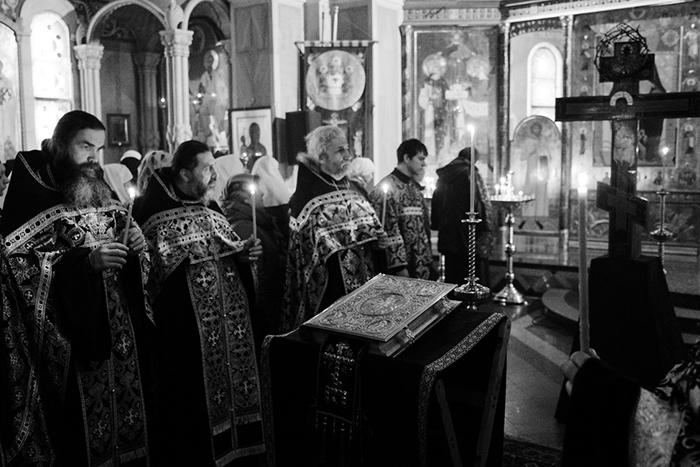
The Passion is held four times during Lent – on the first, second, third, and fourth Sundays. For many people, the Passion, which means ‘suffering’ or ‘agony’, is one of the favorite divine services of the Great Lent. Nevertheless, it is controversial whether or not to perform this service in an Orthodox church in contemporary liturgical tradition. All the more so because there are the Week of the Cross and the Holy Week that are dedicated to the same topic. The main argument against the Passion service is its Latin, i. e., Western origin. The second argument is that there is no mention of the Passion service in the Typikon. Well, should we go to the Passion service or not? Here is what Bishop Sylvester (Stoichev), the Rector of the Kiev Theological Academy, has to say about it.
Indeed, the Passion as a church service is of late origin and is not covered by the Typikon. The appearance of this order of worship in our liturgical tradition is associated with the name of the Kiev Metropolitan Peter Mogila.
It is often said that the Passion should not be held because of its Latin origin. Such views are sometimes expressed both by clergy and by laymen.
It seems that experts in historical liturgics can easily demonstrate what in this divine service was borrowed from Latin sources, when it was borrowed, and how it all happened. We must, however, look at the content and meaning of this office.
To begin with, it should be noted that this service, compiled by Holy Metropolitan Peter, is basically the reading of the Passion Gospels and hymns derived from the Lenten Triodion, which means that no Latin sources were used. It was as late as the 19th century that the reading of the Akathist to the Passion of Christ, written by St. Innocent of Kherson, also became part of the Passion service. Anyone can read this creation of the saint and try to find anything in that akathist that might hint at Latin influence. Every attentive reader will find out that it contains nothing of this kind.
Of course, I have had occasion to meet those interested in finding Latin influences in Russian theology and worship practice, who, for example, have seen traces of this very influence in the words Jesus, God of my heart, come and unite me with you forever! from another akathist by St. Innocent. They argued that these words were inspired by the Catholic cult of the heart of Jesus. I assume that those people had never bothered to think that even in the Orthodox tradition the word ‘heart’ is multidimensional and is used in different meanings.
Thus, neither the office of the Passion by Saint Peter, nor the akathist by Saint Innocent have anything Latin in them.
Moreover, there is no focus on emotional compassion for the suffering of Christ, which is emblematic of the ascetic practices of certain Catholic mystics, in the very text of the Passion service.
The Passion service reminds us of the sufferings of Christ and gradually ushers us into the divine service of Holy Week. In this sense, this divine service is in harmony with other liturgical texts of Lent.
I am convinced that the Passion is quite Orthodox in content and form.
Only a hypertrophied desire to see some kind of foreign influence in all things can lead one to see Latin ideas in this service.
***
By the way, each Passion includes one of the Gospel accounts of the Passion of Christ: Matthew 26 and 27 at the first Passion, Mark 14 and 15 at the second Passion, Luke 22 and 23 at the third Passion, John 18 and 19 at the fourth Passion. Once the Passion is over, the choir continues singing, and with the words We worship Thy Passion, O Christ the whole assembly bows down to the earth. At the end of the service, all the believers come to worship the Crucifixion, the Cross of Christ, which is placed in the middle of the temple as the prime focus of Lent.
Translated by The Catalogue of Good Deeds
Source: https://pravlife.org/ru/content/passiya-sluzhit-ili-ne-sluzhit



